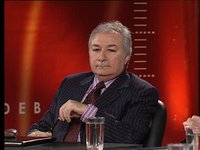This House believes that Iran poses the greatest threat to security in the region
Tuesday March 28 2006
MOTION REJECTED
by 36% to 64%
Transcript
Order of speeches

- Introduction
- Nazenin Ansari
- Michael Axworthy
- Mustafa Alani
- Sadegh Zibakalam
- Audience questions
- Vote result
Introduction
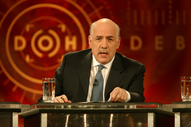 TIM SEBASTIAN
TIM SEBASTIAN
Ladies and gentlemen, good evening and a very warm welcome to the latest in our series of Doha Debates sponsored by the Qatar Foundation. Iran is now at the centre of a growing international crisis over its nuclear intentions. Its move to restart uranium enrichment is seen by the US as a step on the way to a nuclear weapon, but the Iranian government says its nuclear programme is exclusively peaceful. Who's telling the truth and can any of us know for sure? Our motion tonight is that 'This House believes Iran poses the greatest threat to stability in the region' and our panel reflects the wide divisions this issue has provoked. Speaking in favour of the motion, Nazenin Ansari. She's diplomatic editor of the weekly Persian language newspaper Kayhan based in London, and a frequent commentator on Iran. With her is Dr. Mustafa Alani, senior adviser and director of the Security and Terrorism Department of the Gulf Research Centre in Dubai. He has both British and Iraqi citizenship. Against the motion Michael Axworthy, former Head of the Middle East Department of the British Foreign Office. He now teaches Middle East history at Exeter University and his biography of the Persian Monarch, Nadir Shah, is about to hit the bookstands. And with him is Sadegh Zibakalam. He's Professor of Political Science at Tehran University. Formerly a political activist, he spent several years in jail for protesting against the Shah's regime. He's the author of several books on Iran and the Islamic Revolution. Ladies and gentlemen, our panel. And now let me ask Nazenin Ansari to speak first for the motion.
Nazenin Ansari
Speaking for the motion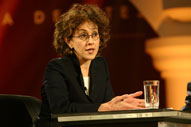
NAZENIN ANSARI
At a time when the countries in our region like Qatar, UAE, Bahrain, Kuwait, are benefiting from growth and development, there is one country that's standing at the edge of an abyss and that is my country, Iran. This is not because of the lack of want for us Iranians for a better life, but rather because of the nature and behaviour of a regime that its concept, the basic concept of this regime that it's founded on, is the totalitarian concept of control in the hands of a few, and with a mission, a core mission enshrined in its constitution, to export the revolution. In effect, the priority of the Iranian regime at the moment lies beyond the borders of Iran, and at the expense of the betterment and the livelihood of Iranians. Instead of investing and developing the infrastructure of the country, like gas and oil, they are diverting the resources and the funds into a ballistic missile programme, into a dubious Chernobylised nuclear programme, and into plans to undermine the stability in Iraq and Lebanon. Indeed, the regime in Tehran stands alone in the world in the rejection of the two-state solution for the Middle East conflict. Now, why all of this? Because the regime in Iran wants to divert attention from the massive failure in Iran. Our region today is more turbulent than ever in the past 27 years. If you take four crises right now that are confronting us, which is Iraq, Lebanon, the nuclear crisis and Palestine, unfortunately Iran's regime plays the decisive role in all of these crises, in each and every one of them. Now, why do they do it? Because of its misplaced and disjointed priorities. As such the Islamic Republic is the indigenous cause of instability in the region.
TIM SEBASTIAN
Nazenin Ansari, thank you very much indeed. Only one country at the edge of the abyss? King Hussein once described this as a very rough neighbourhood. Quite a few at the edge of the abyss, aren't there?
NAZENIN ANSARI
There is no hope in Iran. That is, when you don't have any hope, the social malaise in Iran, the economic malaise in Iran ...
TIM SEBASTIAN
Why is there no hope? There's a huge diversity of opinion in Iran.
NAZENIN ANSARI
There is a whole diversity of opinion in Iran, but when you look at the demography, 70% are under the age of 30, but every year the country has to provide 800,000 jobs. There are not enough jobs, and you see every year according to the World Bank, 400,000, the best of our minds ...
TIM SEBASTIAN
This is a problem throughout the region.
NAZENIN ANSARI
Unemployment, 400,000.
TIM SEBASTIAN
Unemployment throughout the region. In the Palestinian territories, it's up to 60%.
NAZENIN ANSARI
400,000 of our best minds are leaving the country. These are the people who can build the country and instead they end up as refugees at the doors of countries in Europe.
TIM SEBASTIAN
You paint Iran as the major threat in the region.
NAZENIN ANSARI
Yes.
TIM SEBASTIAN
Isn't the problem that nobody knows quite where Iran is going, what its intentions are, what its nuclear programme is for. There's a lot of doubt. That doesn't make it the biggest threat in the region, does it, just because there are lot of doubts about it.
NAZENIN ANSARI
In these four crises that I mentioned, Iraq, Lebanon, Palestine ...
TIM SEBASTIAN
What's this problem in Iraq for instance? It's getting on very well with the new government there. They've just loaned them a huge sum of money.
NAZENIN ANSARI
There is not. Every day there is a deep division between even the Iraqi Shi'ites and ...
TIM SEBASTIAN
But they've just loaned them a huge sum of money, they're getting on very well, government to government, putting the past behind them.
NAZENIN ANSARI
But there are still the indigenous forces of instability operating in Iraq. There is no hope even for the Iraqis inside about having possibly a better government, a better state of economy within the next year or two, and who is benefiting from that?
TIM SEBASTIAN
They're more unstable, they're more of a threat to Middle East stability than Pakistan for instance?
NAZENIN ANSARI
No, if Iraq becomes democratic as the people of Iraq want, and they are going every time at these elections and they are the ones who are voting, who will be the loser?
TIM SEBASTIAN
To put Iran in this slot, to label it as the major threat, you need more than rumour, hearsay, uncertainties and doubt.
NAZENIN ANSARI
It is not rumour, it is not rumour and it is not ...
TIM SEBASTIAN
Which is what you've given us so far.
NAZENIN ANSARI
It is not rumour and it's not hearsay. The facts and the figures are there, and where is Moqtada Sadr getting his money? There is fight between Mr. Jafari and the others, so why?
TIM SEBASTIAN
There's a lot of good work being done by Iran in Iraq, isn't there? A lot of supplies being given to people, a lot of social work being organised around the mosques. What's wrong with that?
NAZENIN ANSARI
Of course and at the same time there are a lot of indigenous causes of instability that they're pouring money into.
TIM SEBASTIAN
Nazenin Ansari, thank you very much indeed.
NAZENIN ANSARI
Thank you.
TIM SEBASTIAN
And now let me call on Michael Axworthy please to speak against the motion.
Michael Axworthy
Speaking against the motion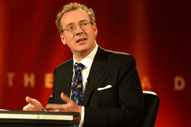
MICHAEL AXWORTHY
I do not agree that Iran is the greatest security threat in the region. The date for the end of the last period when Iran was a serious threat to her neighbours was June 1747 when Nader Shah died. Iran is not an aggressive or expansionist power, and has not been one for a very long time. I'm not an apologist for the current regime in Iran. It's a repressive regime, it's manipulated the system to stay in power, though there are other regimes in the region that are as bad if not worse. But Iran has not yet acquired a nuclear weapon and is several years away from doing so. I accept that there is potential threat, but the gravity of it depends on how the problem is handled, and there are many other potential or actual threats in the region: Iraq, the Israeli/Palestinian problem, we've heard about some of them already, Pakistan, even doubts about Saudi Arabia, perhaps above all the threat of a narrow, distorted form of Islam that encourages hatred and violence, whether under the heading of al Qaeda or not. Ironically the recent most major threats to stability in the region, Saddam and al Qaeda, were partially created by US and Western efforts to contain the perceived dangers of Iranian influence. In the end, the West had to accept Iranian influence in both Iraq and Afghanistan and work with it. The lesson from this is that problems around Iran are better addressed this way rather than confrontation or containment. We should apply that lesson to the nuclear dispute and handle it pragmatically as is being done with North Korea. The nuclear problem is a potential rather than an actual threat now, but it will turn into a real threat if the West and Iran handle it confrontationally. The best prospect for resolving the problem of hostility between the US and Iran, and the nuclear dispute that arises out of it, is direct US/Iran talks. More widely it would do no harm in the wider relationship between the West and the Islamic world for the US to be seen talking and negotiating with a major Muslim country about a problem rather than threatening or bombing it. Exaggeration and misunderstanding of the potential threat from this problem can also contribute to the confrontation. I therefore urge you to oppose this motion.
TIM SEBASTIAN
Michael Axworthy, thank you very much indeed. You say approach this problem pragmatically. You are looking at a state that has offered to wipe another one off the face of the earth. How pragmatic do you think they should be about it? I'm talking about their comments about Israel.
MICHAEL AXWORTHY
Yes.
TIM SEBASTIAN
It's easy for you to be pragmatic about it.
MICHAEL AXWORTHY
That's perfectly true, and I don't live in the region, which makes it easier. I think the point about it is that Iran, those sorts of statements have been made in Iran. Many of them were made at the beginning of the revolution under ...
TIM SEBASTIAN
But they are being made by this president. We're dealing with the situation as it is now.
MICHAEL AXWORTHY
Yes. Under President Ahmadinejad there's a bit of a renaissance with him of that kind of language. Nonetheless in Iraq and in Afghanistan when it's come to shove, Iranians have discussed those problems pragmatically and have helped establish at least the beginnings of solutions.
TIM SEBASTIAN
But you would agree, and you've been a specialist in this region, that when somebody says they're going to hurt you, it's a good idea to take them seriously, isn't it?
MICHAEL AXWORTHY
I agree, yes.
TIM SEBASTIAN
Because they generally end up doing that.
MICHAEL AXWORTHY
Of course, yes. And it's important to take the problem seriously. I'm not saying don't take the problem seriously.
TIM SEBASTIAN
But then they're a major threat.
MICHAEL AXWORTHY
I'm saying, don't exaggerate it. It could develop into a major threat, but at the moment I think it's a potential threat.
TIM SEBASTIAN
We also have a threat 'to respond to sanctions with causing harm and pain to America.' That's a direct threat of force, isn't it?
MICHAEL AXWORTHY
It's what countries do when they're threatened with harm and pain themselves, which is what sanctions would do.
TIM SEBASTIAN
They're saying something else with that, though, aren't they? That is a threat of force.
MICHAEL AXWORTHY
It's no more a threat of force than the Americans saying 'nothing is off the table.'
TIM SEBASTIAN
How do you describe their actions, how do you explain away the clear attempts to acquire missile technology that could be suitable for a nuclear weapon? You seem so sure that they're several years away from a nuclear missile or weapon, if that's what they're leading towards, how can you be that sure?
MICHAEL AXWORTHY
I think you said earlier that there's doubt about their intentions, and that's obviously the case.
TIM SEBASTIAN
Is it na´ve not to assume that they were planning ...
MICHAEL AXWORTHY
No. I mean, the possession of that missile is a worrying thing, but on its own, it doesn't make it the most major threat in the region and the analysis I've seen, as I say, suggests that any possible nuclear weapon is at least several years away.
TIM SEBASTIAN
But that could be wrong. Mohamed ElBaradei himself said in an interview in 2004, they could be just a year away.
MICHAEL AXWORTHY
Well, that brings it a lot closer than I've ever heard anyone else suggest. I don't personally believe that. I would think 3-5 years at the inside, but as you said, there's a lot of doubt about it.
TIM SEBASTIAN
Michael Axworthy, thank you very much indeed. Mustafa Alani, if I could ask you now to speak for the motion please.
Mustafa Alani
Speaking for the motion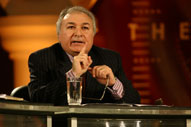
MUSTAFA ALANI
I mean, you listen to the previous speaker saying two things important, that there is a threat he calls potential, and he admitted that he's not living in the region. I live in this region, so before I invite you to really decide your decision in support of the motion or not, you have to look at the other Iran, which the previous speaker described. Within Iran, not the Iran we want in the region, the regional state that behaving as an imperialistic state, a state which interfere in everything in the region and denying everything in the region, denying interference. Here we talk of, there is a triangular lethal combination in the present Iranian set-up, in extreme leadership, producing a lot of provocative rhetoric, an ambitious nuclear programme, and interventionist strategy. Beside the huge and really unpredictable environment or risk involved in such programme, Iran's nuclear programme potentially pose the greatest threat to the security and stability of the region. What the world has discovered in 2003 about the nature of the Iranian nuclear programme has shocked every one of us here in the region. The fact in the IAEA committee, the International Nuclear Agency, reports since, and again what have been revealed by Abdul Qadeer Khan investigation in Pakistan. The Iranian programme has one objective only; it's to build a nuclear capability. If you look at the report of the International Agency, if we look at the investigation on Abdul Qadeer Khan, their requirement basically it is a nuclear weapon, so here we're talking about what Iran represents for us in the region, I don't care what the American or what the Israelis think, I am living in this region. Iran is an occupation state as far as the three islands occupied, and refuse ever to go the International Court of Justice; interventionist state as far as the situation in Iraq is concerned. Our perception that Iran causes the greatest threat to the region, regional security, is based on reality and actual facts. Our negative perception is a natural product and rational outcome produced by a long list of negative Iranian behaviours. Iran cannot adopt an aggressive and expansionist and intimidating policy, and at the same time talk about building trust and friendly, brotherly relations. Iran has to make a choice and change attitude and behaviour accordingly. Iran cannot have both. You cannot claim friendship and trustworthy relation when you seek superiority over your neighbours. Iran is once more underestimating our ability and our determination to defend ourselves and our interest, and defend our survival here in the region. Iran really understands our silence as an agreement, understand our politeness as weakness, and I think I can tell the Iranians that do not indulge in self-deception so therefore I want your support in this motion. Thank you.
TIM SEBASTIAN
Dr. Alani, thank you very much indeed. Your claims that the IAEA in Vienna has accused Iran of making a bomb simply aren't borne out by the facts. The latest report by the IAEA in this month, in March, says, 'There is no evidence of any diversion to nuclear weapons. The agency has not seen indications of diversion of nuclear material to nuclear weapons or other nuclear explosive devices,' so it simply isn't correct.
MUSTAFA ALANI
No, it is correct, I tell you.
TIM SEBASTIAN
Well, this is exactly what they've said, Dr. Alani. This is a quote.
MUSTAFA ALANI
The Iranian programme started in 1952. No-one complained until 2003, when we discovered that the Iranians were cheating. There are so many installations that have never been declared, and really they've never been declared for a very simple reason. They are under obligation ...
TIM SEBASTIAN
But there's no accusation by the IAEA that Iran is making a nuclear weapon, it's simply not there.
MUSTAFA ALANI
The accusation they are hiding things, there is a justification for it.
TIM SEBASTIAN
It may be incomplete, the information ...
MUSTAFA ALANI
Not at all.
TIM SEBASTIAN
... because the report goes on to say, 'Regrettably, however, after three years of intensive verification, there remain uncertainties with regard to both the scope and the nature of Iran's nuclear programme.' 'Uncertainties', that doesn't make them the biggest threat in the region, does it?
MUSTAFA ALANI
I'm certain because there is no explanation for two major installations, nuclear installations.
TIM SEBASTIAN
Uncertainty, not fact, not rumour and not conjecture.
MUSTAFA ALANI
They are under obligation under the NPT to declare every activity in the country and they hide these activities for 15 years. When they hide something, there is something. We have the lesson of Saddam Hussein.
TIM SEBASTIAN
There may be something, that's what everybody thought about Saddam Hussein. What did they find?
MUSTAFA ALANI
Well, something for you who live only across the water, something for you, for anybody who live in the UK or something, yes, it's something.
TIM SEBASTIAN
So you're dealing with potential threat to you, we're not dealing with actual threat, which is the subject of the motion.
MUSTAFA ALANI
I think it's a potential threat, it possibly will develop to a real threat very soon if we are not going to do anything soon.
TIM SEBASTIAN
All right, Dr. Alani, thank you very much indeed. Professor Zibakalam, if I could ask you to speak against the motion please, and I'm going to come to the audience straight afterwards for your questions, so please do have them ready.
Sadegh Zibakalam
Speaking against the motion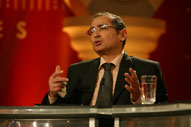
SADEGH ZIBAKALAM
In the name of God, the merciful, the compassionate. Iran has been accused of many things, not only being greatest threat in the region but many other things, but when you look more carefully, you would see that behind all these accusations is the United States, first and foremost, and then the State of Israel. Iran's biggest fault, Iran's biggest guilt is to challenge the US supremacy and the Zionist supremacy in the region, and so far Iranians have paid a great deal for their independence and also for trying to remain independent. As far as the nuclear issue is concerned, Iran has obliged, Iran has co-operated fully and extensively with the IAEA. How many times I ask the audience, how many times the IAEA inspectorate have been able to visit Pakistan? How many times they have visited Israel? And during the past three years more than a dozen times UN inspectors have visited every place in Iran, even they have visited places that everyone knew, at least many Iranians knew that they were not involved with the nuclear programme, yet Iranians said that let them come and see for themselves. And as I said, as far as Iran is concerned, Iran hasn't done anything wrong as far as the international rules and regulation and its obligation as far as the Non-Proliferation Treaty is concerned and all the reports so far that have been compiled by the IAEA does not prove, does not show, does not demonstrate that Iran is trying to have a nuclear weapon. And in any case, to have nuclear weapon for what? To use it against whom? To use it against UAE, to use it against Kuwait, to use it against Iraq? To use it against whom? Why should Iran develop nuclear weapon? Why should Iran have the desire to have the nuclear weapon? That's why I oppose the motion and I ask the audience actually to vote against it.
TIM SEBASTIAN
Professor Zibakalam, thank you very much indeed. You know very well that Iran hasn't co-operated fully with the international community, has it?
SADEGH ZIBAKALAM
In what sense you mean?
TIM SEBASTIAN
Well, they've repeatedly said in their reports, the IAEA, time and time again, they have not had full co-operation. In the latest report, they said that, 'This is a matter of concern that continues to give rise to questions about the past and current direction of Iran's nuclear programme.' Why would the IAEA, which has fallen over backwards to give you time to comply fully and co-operate fully, why would it write things like that if you were co-operating fully? You haven't been.
SADEGH ZIBAKALAM
Well, it's not really the case because IAEA have inspected, as I said, time and again, every place in Iran, as I said, even places that were not involved in a nuclear programme.
TIM SEBASTIAN
They can't be constantly inspecting everything, 24 hours a day, day after day.
SADEGH ZIBAKALAM
Obviously, yes, of course.
TIM SEBASTIAN
You know perfectly well that there are plenty of gaps in the system.
SADEGH ZIBAKALAM
What I'm trying to say is that according to none of the reports that have been complied [sic] so far, we cannot reach the conclusion that Iranian are definitely after making atomic weapon.
TIM SEBASTIAN
No, but you have lied and obfuscated the situation with regard to your nuclear programme. That is clear and that is on the record.
SADEGH ZIBAKALAM
There have been misdemeanour, there have been some mistake, I agree.
TIM SEBASTIAN
Some lies, not mistakes, lies, haven't there?
SADEGH ZIBAKALAM
No, I don't think so, I don't think so.
TIM SEBASTIAN
Well, your own ambassador at the United Nations, the former ambassador, he acknowledged there had been lies. He said, 'Well, you pushed us into a corner, we had sanctions against us, what did you think we were going to do?'
SADEGH ZIBAKALAM
But you see, when you are under the focus and obviously some of your activities, some of your operations and some of your dealings might be wrong, I agree with that, but as a whole, Iran has been co-operating with IAEA, so far anyway.
TIM SEBASTIAN
All right, Professor Zibakalam, thank you very much indeed.
Audience questions
TIM SEBASTIAN
Now, a reminder of our motion, that 'This House believes that Iran poses the greatest threat to stability in the region' and we have a lot of hands up. There's a gentleman in the third row, we'll go to you first please. AUDIENCE Q (M)
AUDIENCE Q (M)
My question is to the arguers against the motion. Recently Iran has threatened to pull out of the NPT. Doesn't that make it threaten the region and doesn't that make the whole states in the Gulf and the Middle East vulnerable?
SADEGH ZIBAKALAM
Can I respond?
TIM SEBASTIAN
Yes please, yes, it was directly to you.
SADEGH ZIBAKALAM
Yes, okay. Iran has said that we have done, we have responded, we have obliged all our duties that we had as far as co-operating under the umbrella, under the threshold of NPT was concerned. However, if under the pressure of the United States Iran would become sanctioned through the UN, then, Iran doesn't see any reason why it should carry on co-operating with NPT, but if Iran is not sanctioned by the UN, then the co-operation with NPT would go on as it has been during the past years.
TIM SEBASTIAN
So you're only prepared to co-operate if there are no sanctions against you?
SADEGH ZIBAKALAM
Exactly. I mean, what's the point of co-operating with NPT if Iran is sanctioned?
MUSTAFA ALANI
You are under a national obligation. You mentioned in your statement Pakistan and Israel. Pakistan and Israel never sign any agreement. They are not under international legal obligation. You are under legal obligation, this is the difference. Don't mix the apple with the oranges.
SADEGH ZIBAKALAM
And we have co-operated.
MUSTAFA ALANI
No, no.
SADEGH ZIBAKALAM
And we have co-operated with the IAEA.
MUSTAFA ALANI
You are not, you are not. You were caught cheating.
SADEGH ZIBAKALAM
Yes, but Dr ElBaradei should say that we have not co-operated, not you, Dr. Alani.
MUSTAFA ALANI
No. The question here, the question of the Iranian nuclear issue has never been an issue until we discovered you are cheating. It is like Saddam Hussein scenario, and Saddam Hussein, all the globe supported disarming Saddam Hussein.
TIM SEBASTIAN
Can we let him answer that please? Have you anything more to say on that?
SADEGH ZIBAKALAM
Iran fundamentally has not cheated, Iran has fundamentally and basically co-operated under its obligation with IAEA.
TIM SEBASTIAN
We'll go to a question up there please.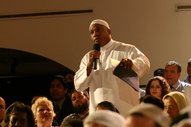 AUDIENCE Q (M)
AUDIENCE Q (M)
I have a question for against the motion. I just want to say that knowing that Iran first founded a political party in Lebanon and is financially helping the political party in Lebanon, how can't it be a threat to the political stability of Lebanon today, knowing everything that's happened in Lebanon?
TIM SEBASTIAN
Michael Axworthy, would you like to take that?
MICHAEL AXWORTHY
I mean, Iran's involvement in Lebanon is there and it's known. From the perspective of wanting to resolve the problems in Lebanon and also the problems between the Israelis and the Palestinians, it's not a helpful factor, but I think we have to look at those problems as they are. If those problems were on their way to being resolved, I think the question of Iranian involvement in it would drop away. Those problems need to be solved in their own right.
TIM SEBASTIAN
Do you agree with that, accept that?
AUDIENCE Q (M)
Yes, partially.
TIM SEBASTIAN
Yes? You've got a convert then. There's a lady in the fourth row up there. 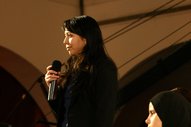 AUDIENCE Q (F)
AUDIENCE Q (F)
My question is to the team which is in favour of motion. Do the regional governments think that Iran is great threat to region?
TIM SEBASTIAN
Do you want to take that?
MUSTAFA ALANI
I'll tell you why. I live in this region. Iran for me represents an imperialist power.
SADEGH ZIBAKALAM
Why?
MUSTAFA ALANI
Well, why? You occupy the three islands and we are only asking, we are not saying these island is ours, we are not saying this island is yours, we are saying to go International Court of Justice and let us.. Qatar and Bahrain went to their court, and Israel on top of that went with Egypt to the Court. You are endorsing Israel when you refusing to go to the Court. This is an occupied island, let's go to the Court and for me you are ...
TIM SEBASTIAN
All right, Michael Axworthy.
MICHAEL AXWORTHY
Firstly those islands were occupied not in the time of the Islamic Republic but in the time of the Shah.
MUSTAFA ALANI
This make it worse.
MICHAEL AXWORTHY
Secondly, really to go from the greatest threat in the region to Abu Musa and the Tunbs, I feel is from the sublime to the ridiculous.
MUSTAFA ALANI
This is hypocritical, when you help Hezbollah to liberate the occupied land from the Israeli and the Iranian themselves has occupied them.
TIM SEBASTIAN
Okay.
NAZENIN ANSARI
My concern is not about the islands. My concern is about the nuclear programme in Iran. 70% of Iran is earthquake prone. Now, we don't know if there has ever been a study about the safety of all these nuclear installations that are being built. The technology that they are using is coming from Russia, it's not European, and it's a technology that created Chernobyl. Kuwait lies 250 kilometres away from Iran. Now, with a country with so much earthquake and suddenly to have a Chernobyl happen in that country, of course it will not only affect Iranians but it will affect you guys as well, you are in the Persian Gulf, so my concern is more environmental rather than the concern of my partner here who is about the islands, but at the same time, of course once again it's Lebanon, it's Iraq, it's Palestine, together with the nuclear issue. In every single one of them, if you remove the Islamic Republic from the domain of these issues, the indigenous cause of this stability will be resolved.
TIM SEBASTIAN
We've got a lot of questions. Gentleman in the front row, we'll get a microphone to you, if you would stand up please.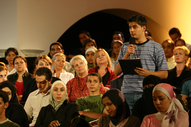 AUDIENCE Q (M)
AUDIENCE Q (M)
Don't you think there is another country that threatens the region more than Iran?
TIM SEBASTIAN
Do you want to take that?
MUSTAFA ALANI
I'll tell you what. Certainly Israel is a major threat, but two wrongs don't make one right. The Israeli nuclear power cannot be considered as a licence for other countries to be nuclear as well. We should not accept this principle, otherwise we are going to start a very dangerous arms race in the nuclear weapon in the region, so the fact that, and the difference between Israel and Iran, Iran signed international treaty saying they will never possess nuclear weapon. Israel, Pakistan, India never signed.
TIM SEBASTIAN
Okay, let's bring Professor Zibakalam in on this.
SADEGH ZIBAKALAM
Can I just respond to what my Iranian co-participant Nazenin said. I really cannot understand why Iran's support for Hezbollah in Lebanon, and why Iran's support for Hamas, an Islamic group in Palestine should be regarded as interference and as Iran tried to destabilise the region.
NAZENIN ANSARI
Iran is the only country, unfortunately not Iran, the Islamic regime in Tehran is the only country in the world that is against the 2-state solution.
TIM SEBASTIAN
But his point is that every country is interfering in the region, aren't they? Every country is interfering everywhere.
NAZENIN ANSARI
No. Is Israel in Iraq, Dr. Zibakalam? Is Israel in Lebanon, Dr. Zibakalam?
MUSTAFA ALANI
Iran has supported Hezbollah in Lebanon.
NAZENIN ANSARI
At the expense of Amal, at the expense of Amal.
MUSTAFA ALANI
Yes, all right, Amal is a Shi'ite organisation.
NAZENIN ANSARI
Exactly.
TIM SEBASTIAN
Can we let him finish please?
MUSTAFA ALANI
But the point is that Iran's support for Hezbollah in Lebanon, Iran's support for the Shi'ites in Lebanon actually managed to kick out Israelis from South of Lebanon, and this is something that every Lebanese would agree.
NAZENIN ANSARI
And instead the Syrians came in and look what happened next.
MUSTAFA ALANI
I want to ask you, you tell me that you are against Israel. Why you went and bought Israelis' arm in 1985/86, for one year, go and read Iran Contra files. You buying Israelis' arm, Israelis' planes have been landing in your airport for one year, supplying you with arms.
TIM SEBASTIAN
You're saying Israeli arms, are you?
MUSTAFA ALANI
American arms supplied by Israel, delivered by Israeli plane.
TIM SEBASTIAN
But this was 20 years ago. We're dealing with the current time.
MUSTAFA ALANI
It doesn't matter. Twenty years ago the attitude toward Israel was much harder than now, so the question is not the principle, the question of interest. Don't try to say ...
TIM SEBASTIAN
Okay. We'll take a question from the gentleman in the front row there, if we get a microphone to you, please sir. 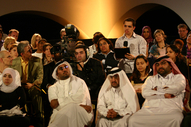 AUDIENCE Q (M)
AUDIENCE Q (M)
Good evening. I have a question for against the motion. With regards to now, if Iran does not comply with UN regulations regarding the nukes, one; two is rumours about Iran supporting the Shias in Iraq which is turning into more instability in Iraq. This would reflect badly on the economy of the region. Today the GCC countries' economy is in a boom and we feel that for any retaliation from the US or indeed in the Western world against Iran in the near future would definitely create a huge impact over our economy, so this does concern us as GCC nationals or the Arab region.
TIM SEBASTIAN
What's your question?
AUDIENCE Q (M)
The question is, against the motion, Iran does have a huge threat over GCC and we would like to know why wouldn't Iran like to comply with the UN regulations? Why don't we, I mean, we would like to live in peace for at least the next ten years of our lives. We have been in wars for the last decade, the decade before starting from Iran/Iraq War to the Gulf War to the second Gulf War and onward.
TIM SEBASTIAN
Michael Axworthy.
MICHAEL AXWORTHY
I think what you're talking about is a very serious worry, and this concatenation of problems, of escalation of problems, of it having an effect on the economies, of other factors being drawn in, I mean, that is a concern and that is the point I was making, that this problem needs to be gripped and it needs to be taken seriously, but it needs to be taken realistically and without exaggeration.
TIM SEBASTIAN
What does that mean, in context?
MICHAEL AXWORTHY
Well it means, I think it means the US and the Iranians talking directly, and not through other parties, not through whisperings.
TIM SEBASTIAN
But they're going to talk directly, aren't they, about Iraq?
MICHAEL AXWORTHY
They're going to talk directly about Iraq and that's very welcome but it needs to address this issue too, I believe.
NAZENIN ANSARI
But they have been doing it all this time. They have been doing it. They have, Dr. Zibakalam, you know, they have been talking all the time. It's the first time that the Islamic regime in Iran is publicising it. Why is it publicising it? You tell me.
SADEGH ZIBAKALAM
Well, as far as I know and as far as the world knows, Iran and the United States have not been negotiating secretly. It would have been kept secret in Iran, but surely everyone would have known about it in Europe and in America, in other parts of the world. The reason why the Islamic regime has been reluctant to have direct negotiation with the United States, because United States doesn't like to sit down and talk with Iranians on equal term.
TIM SEBASTIAN
It's not just the United States, is it? It was the Ayatollah Khomeini who said, 'Don't talk to the United States.' There was a fatwa against talking to the United States.
SADEGH ZIBAKALAM
Exactly, why? Because United States has a habit of dictating to everyone else.
TIM SEBASTIAN
All right.
SADEGH ZIBAKALAM
And Iran is the only country that wants to remain independent.
TIM SEBASTIAN
Okay. We're going to move on now to a question in the second row. The lady has been very patient.
AUDIENCE Q (F)
Good evening. I wanted to ask against the motion about why the United States takes the side of enemy for Iran?
SADEGH ZIBAKALAM
Shall I respond to that?
TIM SEBASTIAN
Would you like to take that?
SADEGH ZIBAKALAM
Because for decades the Iranian regime, before the Islamic Revolution, was simply a puppet of the United States, and because of the Islamic Revolution there are many faults and there are many things that are wrong with the Islamic Revolution and after the Islamic Revolution, but one thing no-one can deny, it is the integrity and independence of the Islamic regime and United States doesn't like. United States doesn't like any regime in the world which is independent.
TIM SEBASTIAN
Dr. Alani.
MUSTAFA ALANI
You care for your independency and integrity, you don't care about other independency and integrity, your intervention in Iraq, your intervention in Iraq, you have to look at it different. Again, this is double standard. You talk about your independency and integrity but you are basically violating other country independency.
SADEGH ZIBAKALAM
The Iraqis raided Iran and imposed 7 and 8-year war against Iran. What are you saying?
MUSTAFA ALANI
Five meetings of neighbouring country, you agree on the principle of intervention with other six countries are surrounding Iraq, and you are the only one who violated this agreement, so really you are not only breaking international law on the nuclear issue, you're breaking by your intervention you're breaking again your regional commitments.
TIM SEBASTIAN
All right, we're going to go to another question, lady in the sixth row.
AUDIENCE Q (F)
My question is for those that are against the panel. I want to know what in the political internal situation of Iran makes you think that it represents a danger to the stability of the Middle East? Why are we asking all these kind of question nowadays? Why is it taken as a threat when the countries in the region already have atomic bomb, when Iran is only asking to have atomic energy for civil use?
TIM SEBASTIAN
Actually I think it's better to put that to this side of the team. Can we have a question to you, Nazenin?
NAZENIN ANSARI
Yes. There hasn't been a debate inside Iran, open debate inside Iran with the Iranian people about implications ...
SADEGH ZIBAKALAM
In the countries in the world, there is a public debate about a nuclear weapon.
NAZENIN ANSARI
They don't even announce ...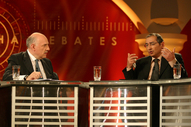 SADEGH ZIBAKALAM
SADEGH ZIBAKALAM
Oh, come off it. What countries in the world people sit and talk about the nuclear issue and they vote for it and they take a referendum.
TIM SEBASTIAN
Can we let her reply please?
NAZENIN ANSARI
The most important issue facing the Iranian nation at the moment and the Iranian people are not being allowed to have information about the safety implications, about the economic implications. For God's sake, good doctor, we have the third largest known oil reserves in the world. Our gas reserves are the second largest, but still after 27 years of Islamic rule in our country, we are now net importers of refined oil and we are net importers of gas. Why? Because there hasn't been any investment in that.
TIM SEBASTIAN
Let him answer please.
SADEGH ZIBAKALAM
Because there has been huge expansion because there are many houses in Iran that are using natural gas, and 10 years ago, 15 years ago, 20 years ago they were not there. There are many Iranians who are having a private car and that's why there is so much consumption of the fuel, etc. etc.
MUSTAFA ALANI
Do you justify your nuclear programme on these grounds?
SADEGH ZIBAKALAM
Well, I can't see why Iran is the only country in the world that its peaceful nuclear programme is causing so much concern.
MUSTAFA ALANI
If it's peaceful, we have no problem. You have peaceful nuclear programme since 1952. We never complain on this side.
NAZENIN ANSARI
Why didn't you allow a referendum to take place in Iran? Yes, let the people cast their votes.
TIM SEBASTIAN
Let him finish.
SADEGH ZIBAKALAM
In what other countries in the world, even in the most democratic country in the world, in which of those countries they have taken referendum over the nuclear issue? You tell me that, Nazenin.
TIM SEBASTIAN
Let me just remind everybody of the motion because we might be getting a little far away from is, is that Iran poses the biggest threat to regional stability. There's a lady in the second row here who has a question.
AUDIENCE Q (F)
Good evening. My question is for Mr. Alani. I'd like to ask why are we badgering Iran about their nuclear capabilities when we know for a fact that Israel has far more advanced nuclear capabilities, and I don't think anyone can deny that these are used for weapons, and it was by your own admission that you said that Iran has an ambition. We have no proof yet and Iran signed an agreement, I mean, signing the agreement, isn't that a proof of goodwill? Why don't we say to Israel, 'Why haven't you signed an agreement at least?
MUSTAFA ALANI
Well, when you sign agreement you have to stick to it, first, and this is our problem with Iran. Secondly, this is not really saying Iran has no right to develop a nuclear, a military programme. This doesn't mean we legitimise the Israelis' nuclear weapon at all, don't understand it this way. We have one bully in the region nuclear, we don't need another one. Secondly, this is not licensed. In legal term Israel, Pakistan and India, they have completely different rules on them, because they never signed any agreement which obliged them not to develop nuclear weapons.
TIM SEBASTIAN
Let her come back.
AUDIENCE Q (F)
That's fair but doesn't that prove that they're most hostile because they have not signed an agreement. We should be worried about the threat from them more than Iran, who has signed an agreement and who will face sanctions.
MUSTAFA ALANI
We are not asking the Iranian any favour. We are asking the Iranians to stick to what they sign, first. Secondly, you know ...
SADEGH ZIBAKALAM
The Iranians have exactly done so, Mr. Alani.
MUSTAFA ALANI
Well, go and read their agency report and there is a question mark and exactly the same question mark we said about Saddam Hussein. Exactly you have two programmes. You have the legitimate, clear programme, which is legitimate under international supervision, and basically you're feeding the illegal programme from that programme. You're using the legality of your programme which is under NPT to feed and to support that secret programme.
TIM SEBASTIAN
Michael Axworthy, a quick word before we move on.
MICHAEL AXWORTHY
Well, you said the same doubts that we had about Saddam Hussein. Where did that end, where did that lead?
MUSTAFA ALANI
The assessment on Saddam Hussein in nuclear programme was accurate. We're talking about the other, the chemical and biological.
TIM SEBASTIAN
It doesn't seem as though anything was very accurate, does it, in Iraq?
MUSTAFA ALANI
The nuclear programme was right and the assessment was right and the nuclear programme ended in 1993 completely.
MICHAEL AXWORTHY
In Iraq they didn't find a smoking gun. In Iran there isn't even a gun.
TIM SEBASTIAN
All right, let's move on. There's a lady in the second row who has a question there.
AUDIENCE Q (F)
My question was more or less the same as the lady there, the previous question. I'd just like to add to it that shouldn't we be having a Doha Debate about whether Israel or India or even Pakistan for that matter pose the greatest threat in the region. And the second part of my question ...
TIM SEBASTIAN
Why because it's your view that Israel does pose a greater threat?
AUDIENCE Q (F)
We should have a Doha Debate about them being the greatest threat, instead of Iran being the greatest. It is a threat, I won't say that it's not a threat, but it's almost the same as any other country having a nuclear programme, whether it be the first-world countries or the second-world or the third-world countries.
TIM SEBASTIAN
But since we're dealing with a debate that we have at the moment, where do you stand?
AUDIENCE Q (F)
Pardon?
TIM SEBASTIAN
Since we're dealing with the debate that we have at the moment, where do you stand?
AUDIENCE Q (F)
I think we should, Iran is not the current problem as far as the nuclear trade is concerned. I think Israel and India pose the greatest threat because they are having a continued nuclear weapons programme. They're constantly raising their defence budgets.
TIM SEBASTIAN
Nazenin, do you want to come back on that?
NAZENIN ANSARI
Well, as far as the difference between Israel and Iran are concerned, the thing is, at the moment Iran needs to join the international community. It needs to be joining the World Trade Organisation. To do that, it needs to have the trust and confidence of the international community, so that its word can be taken. No-one would accept Iran's word when it signs that agreement for the WTO, it needs inward investment. If it's not even willing to abide by the Paris Protocol that it signed and by the new NPT ... Of course the problem right now with the nuclear issue in Iran is that it has been not abiding by the safeguards agreement. That is why it's at the UN Security Council.
TIM SEBASTIAN
Let her come back. You're not entirely happy with that, are you?
AUDIENCE Q (F)
Probably you're right but still I think Iran, how should I put it, like the IAEA are satisfied to a certain level, and we can't just corner a country just because of uncertainties and doubts, and as Mr. Axworthy very correctly said that if we corner a country, a government, aggression would lead to aggression. We've already seen the results of the Iraq invasion.
NAZENIN ANSARI
It hasn't been cornered. You see, as a sovereign nation, it agreed to suspend all nuclear enrichment, uranium enrichment programme, and then time after time, the international community, the IAEA board, they asked for it to suspend its activities. At the end of February 4th, there was another chance given to it, but it hasn't taken the chance. Now, I don't know why this is playing such havoc with people's lives in Iran.
SADEGH ZIBAKALAM
I answer you now.
NAZENIN ANSARI
Why?
SADEGH ZIBAKALAM
Because under the NPT and under no other rules and regulation, Iran and no other member of NPT is not obliged to halt its nuclear enrichment programme. Iran actually halted its enrichment programme for more than two years as a confidence-building measure, and unfortunately, unfortunately Iran received more hostility, more animosity.
NAZENIN ANSARI
Didn't it sign an additional protocol, did it sign the additional protocol as a sovereign nation, Dr. Zibakalam? Did it put its signature on to that agreement?
SADEGH ZIBAKALAM
What I'm trying to say is that Iran, by resuming its enrichment has not violated any rules or any regulations.
TIM SEBASTIAN
Okay. We're going to go to a gentleman in the third row there and then the lady at the back.
AUDIENCE Q (M)
My question to Mr. Sadegh. What do you think is the greatest challenge in Iran today and how can this challenge be addressed?
SADEGH ZIBAKALAM
What is the greatest challenge? I think the greatest challenge as far as Iran is concerned is the hostility of the Bush Administration against the Islamic regime, because it might push the Islamic regime into a corner, that Iran leaves NPT altogether, and if there is sanction against Iran at the behest of the United States, then the whole region would suffer.
TIM SEBASTIAN
Hostility the biggest problem? And what about the poverty, the mounting poverty in Iran?
NAZENIN ANSARI
25 social ills: violent crimes, drug addiction, abused children, runaway girls, dysfunctional families, increasing divorce rates.
TIM SEBASTIAN
Can we let him finish now, please?
NAZENIN ANSARI
Suicides, white slave trade.
TIM SEBASTIAN
Thank you, thank you very much, thank you. You made your point, now let him make his.
SADEGH ZIBAKALAM
First of all, I'm not saying that Iran is not without problems. No-one can say that. Iran has lots of problems, but Nazenin, which country in the world doesn't have those problems?
NAZENIN ANSARI
But the priority of the government is ...
TIM SEBASTIAN
Let him finish, please.
SADEGH ZIBAKALAM
Which country in the world doesn't have those problems? You talk about democracy. You tell me apart from Turkey and apart from the State of Israel, you mention any other Middle Eastern country that during the past two decades have had as many elections as Iranians have been having.
TIM SEBASTIAN
All right, okay. We're going to move on now, there's a lady at the back.
AUDIENCE Q (F)
For the people against the motion, I want to know ...
TIM SEBASTIAN
Are you from Iran?
AUDIENCE Q (F)
I am from Iran, and specially directed to Mr. Zibakalam, how do you compare the efforts of Mossadeq, long time ago, for obtaining an independent oil industry for the country, to the efforts of Iran right now for requiring independent nuclear power?
SADEGH ZIBAKALAM
Yes, there are a number of Iranians including many Iranian leaders who are actually arguing on the same historical parallel. They're saying that the West, meaning particularly the United States, did not let Iran to have its nationalised, its independent oil industry, and United States after nearly 40 years is not allowing Iran to have its independent nuclear industry, and any people are feeling in Iran it's the same thing. We are against United States, we were against United States when it was a question of oil nationalisation, and we are against United States when it's come to the question of nuclear issue.
TIM SEBASTIAN
I just want to ask the questioner what lay behind that question. Are you suspicious about Iran's nuclear programme, as an Iranian?
AUDIENCE Q (F)
Actually, there are definitely possibilities.
TIM SEBASTIAN
Is that a yes?
AUDIENCE Q (F)
I can't give you an answer, but Mossadeq as well, he faced lots of oppositions but the country did acquire a great deal of fortune afterwards.
TIM SEBASTIAN
All right, we'll move on.
MICHAEL AXWORTHY
Can I say something?
TIM SEBASTIAN
Michael Axworthy, you want to have a say.
MICHAEL AXWORTHY
I think that brings out a very interesting point, which is, I mean, it strikes me very strongly that the Iranian government doesn't seem to be, what could I say, it doesn't seem to be following its policy, adapting its policy on the hoof with this. It seems to have a fairly clear idea of where it's going, and the threats of sanctions and even air strikes don't seem to be too worrying or even too surprising to it, and what is happening in the course of all this is that this government that I don't particularly like, that the other side of the panel doesn't like either, is becoming more popular through this confrontation. Is that going to discourage them from seeking nuclear weapons? I don't think so.
TIM SEBASTIAN
Is there anybody else from Iran in the audience, anybody like to raise their hand? Yes, somebody else from Iran up there. Let's take your view on the nuclear issue if we can.  AUDIENCE Q (F)
AUDIENCE Q (F)
Good afternoon. As an Iranian American actually, I'm just wondering, I mean, Nazenin is bringing a lot of problem about Iran out about poverty, prostitution, drugs, whatever. There are these problem and they are all over the world right now. I mean, even when I live in France or America, or environmental problem, whatever problem she brings up, there are all these problem all over this area and the West also, but we're here to know about the nuclear programme. Why would I think that Iran is actually trying to make a nuclear bomb when all these years, I mean, or trying to make it to attack anyone, where all these years was attacked for like eight years, was fault of all the Western countries including with chemicals and still did not defend itself with chemicals, took all the pain. We still have a lot of ...
TIM SEBASTIAN
So is it justified in producing a nuclear weapon now, in your view?
AUDIENCE Q (F)
Not at all, not at all. I do not think Iran does have any intention, because it's against the religion, and if we believe that they are fanatic religious people, we should also accept that fanatically, religiously, they do not want to have nuclear energy.
TIM SEBASTIAN
And you accept that view, do you?
AUDIENCE Q (F)
Yes, I do.
TIM SEBASTIAN
Dr. Alani, do you want to reply to that?
MUSTAFA ALANI
First I don't care what the internal situation in Iran, that's none of my business, OK, whether there is democracy or there is unemployment, this is none of my business. Secondly, I don't care about the Iranian civilian programme. They have the right, I have no problem with that. I have a problem with the Iranian policy on the other front, as an external threat. What has been discovered for the last 2 or 3 years? You know, we're talking about suspension of the enrichment. I want the date of the suspension. Do you know why? Because only when they discovered they are cheating, I say it's cheating basically, they have another programme feeding on the legal programme, is exactly Saddam Hussein's scenario.
AUDIENCE Q (F)
Forgive me but with all due respect, I believe that IAEA has more knowledge of what's going on in Iran, and it has checked and checked and rechecked with cameras for years and they still have not believed that they do have it, and I'm not sure, I mean, with all your dislike about ...
TIM SEBASTIAN
But they don't trust them, do they, one way or the other.
AUDIENCE Q (F)
I'm sorry. I mean, whether if I trust one person or one country or one nation or not, it does not give me a right to hold anything against them, as they have not proven to be guilty. For example, ever since I remember from Persian Empire, they have not attacked any other country, so why should they hold it against them where all these other countries, she's worried about environmental issues. Why should I worry about environmental issue, making a science in Islamic country versus all these Kuwait, Iraq, we have so much nuclear, all these bombing, all these damages. No, I don't believe they do.
TIM SEBASTIAN
We're going to move on now. Gentleman in the third row. Your question, sir.
AUDIENCE Q (M)
My question's for this side of the motion. You stated earlier that Iran can't aim or use its nuclear weapons against countries in this region and it has no desire in doing so. Then how do you explain Iran's threat against the current Israeli government despite the fact that there are neighbours surrounding the Israeli state like Lebanon and Palestine. Isn't this threat itself one of the greatest threats Iran has ever posed on this region, and doesn't it reflect its intentions too?
TIM SEBASTIAN
Michael Axworthy, do you want to take that first?
MICHAEL AXWORTHY
I think I said before, I think that threat, that statement if you can call it that, was a very inflammatory, dangerous and foolish statement, and it is worrying and it's particularly worrying with the suspicion that a country might be pursuing a nuclear weapon, but it's nonetheless a potential problem. So far it is not, the likelihood of that coming to fruition in the near future is just not there, and personally I don't believe that even if in some point in the future if Iran did have a nuclear weapon, I don't believe Iran would use a nuclear weapon. No country, this is one of the truths about nuclear weapons, they are basically unusable. Their only utility is as a deterrent, and I beg to differ with some of the people that have talked about the Israeli nuclear weapon.
TIM SEBASTIAN
They're not exactly confidence-building though, are they?
MICHAEL AXWORTHY
In some circumstances they're not. On the other hand ...
TIM SEBASTIAN
Give me a circumstance where they would be.
MICHAEL AXWORTHY
Right, in Western Europe, in the period of the Cold War. In the end they probably kept the peace.
TIM SEBASTIAN
Only just. A lot of accidents, a lot of near misses.
MICHAEL AXWORTHY
There were, yes. Well, the near misses might have turned into real war if they hadn't been there.
SADEGH ZIBAKALAM
Can I just add one quick sentence to respond to the question?
TIM SEBASTIAN
Please.
SADEGH ZIBAKALAM
Ever since the new Iranian President, Mr. Ahmadinejad, made those remarks about Israel, there was a lot of criticism against it. I personally wrote an article criticising him and the bottom line of that article and all those criticism against Mr. Ahmadinejad and all the other Iranian leaders who made such remarks against the State of Israel is that, look, we cannot be more Palestinian than Palestinians themselves. If the majority of Palestinian have reached or going to reach some kind of understanding with the State of Israel, who are we to say that no, Israel must be destroyed etc. etc. and the official policy of the Islamic regime is not to destroy the State of Israel.
TIM SEBASTIAN
Okay, you want to come back on that.
AUDIENCE Q (M)
I blame Ahmadinejad for increasing the tension against Iran in such foolish statements as your friend mentioned here.
SADEGH ZIBAKALAM
Yes, yes, we think it was unwise and it played into the hands of the people who are against Iran to put further pressure on Iran as far as the nuclear issue was concerned.
TIM SEBASTIAN
But you're saying, 'Put those statements on one side because it's just rhetoric.'
SADEGH ZIBAKALAM
Exactly. It was just rhetoric.
MUSTAFA ALANI
This is your president who you elected in a huge majority.
TIM SEBASTIAN
I don't think the questioner's finished. Did you want to come back on this?
AUDIENCE Q (M)
No, thank you.
TIM SEBASTIAN
You're fine, okay. Lady in the first row, can we go to you please.
AUDIENCE Q (F)
Dr. Zibakalam, do you feel that this nuclear issue is being pressed by the international community as an excuse to invade Iran and pull at Halliburton on you?
SADEGH ZIBAKALAM
Exactly. Not by the international community.
TIM SEBASTIAN
That was a gift, wasn't it?
SADEGH ZIBAKALAM
Yes, not by the international community but by the United States.
AUDIENCE Q (M)
Exactly.
AUDIENCE Q (F)
My country.
SADEGH ZIBAKALAM
Yes, by the United States. It has been used as a pretext by the United States, and I'm pretty certain if tomorrow Iran shut down all its nuclear activity, United States would pick up something else to have a go at Iran.
TIM SEBASTIAN
Nazenin, you wanted to come in on this.
NAZENIN ANSARI
If I may. You know, we're just focusing on this nuclear for Iran. As you know, I believe there are so many other things wrong with the Islamic regime in Iran, and yes, perhaps it hasn't conventionally attacked any country, but you cannot deny the amount of dissidents of the regime that were assassinated in Europe and in the Middle East, in Turkey and in the United States by the agents of the Islamic Republic, and there is also one other fact and that is the martyrdom-seeking recruits and the training that they are instituting at the moment. The regime at the moment is just galvanising the society for confrontation, and recruiting and sponsoring and there's even you have sermons by clerics up to last week saying that, 'Oh yes, we don't need nuclear weapons, we've got Baseges here,' just the same way they sent young children, young boys to cross the mines and become martyrs in the name of the revolution giving them a plastic key to go to heaven.
TIM SEBASTIAN
Okay, Professor, do you want to come back on this?
SADEGH ZIBAKALAM
Iran is a country with 70 million population and I disagree with those who gather somewhere in Tehran or Isfahan and Shiraz as martyrs, potential martyrs and suicide martyrs and so on, but I mean, how many are they, Naszenin, 100, 200, 300, not more than a thousand, and let them gather and discuss and whatever. This is not the official policy of the Islamic regime.
TIM SEBASTIAN
Okay. We're going to go to the gentleman at the side there who's been waiting for some time.
AUDIENCE Q (M)
Thank you. This question is for whoever wants to answer it, maybe Mr. Sadegh. You all speak of nuclear ambitions. Is Iran's plan to create a euro-based oil exchange, also a reason for international oppression?
TIM SEBASTIAN
Do you want to answer that?
SADEGH ZIBAKALAM
Well, obviously if I understood the question correctly, if Iran is sanctioned through the UN, through the pressure of the United States and if Iran cannot export its oil, I don't see any reason why Iran should be sort of watching other countries in the region do business, export their oil and Iran be sanctioned because of the pressure of the United States.
TIM SEBASTIAN
Okay, we'll move to a gentleman at the back there, yes you, sir.
AUDIENCE Q (M)
My question is for against the motion. Do you think that it is intelligent to allow a government that advocates suicide as a healthy and productive war tactic, to have a nuclear weapon that could endanger us all?
TIM SEBASTIAN
I think you've answered that, haven't you?
SADEGH ZIBAKALAM
You see, there are some Iranians, we haven't counted them nobody has taken a census, that are ready to become martyrs for the cause of Palestine, for the cause of Iran, for this cause and for that cause. What do you suggest, that the Islamic regime lock them and throw them all in jail?
NAZENIN ANSARI
There's loads of student in jails.
SADEGH ZIBAKALAM
No, you cannot expect the Islamic regime to sort of try to shut up everyone. They can have their say, but what I'm trying to say is that the official policy comes not through some rightwing vigilantes or some hot-headed fundamentalists, it comes through the Iranian leaders.
MUSTAFA ALANI
You know, it is a dangerous statement coming from your leaders, not from the people on the street.
SADEGH ZIBAKALAM
Dr. Alani, but George Bush, Tony Blair and other leaders in the world make statements ...
MUSTAFA ALANI
No, you see, I don't care what you're doing. I don't care, this is none of my business. I don't care about George Bush. I'm talking, I'm living just across the water with you. If you want to live with me in peace, there is a rule, there is a requirement. If you'll be part of this region, there's a requirement. Now there is a project to declare the region as WMD-free zone. Why you don't join this? If you say you have a fatwa in September 2004, your leader said harm, the nuclear weapon harms, WMD harm, we want to believe you. Believe me, we want to believe you, but your behaviour, the question is, the way you behave, it is not what you say. You cannot compare. If you said you don't intervene in Iraq, look at Iraq, what we've done. And you don't say you are against any occupation? Look your occupation. You say you are not in favour of nuclear weapon? This is what we're getting now, so the question is, you if you want to live in the region, you have to build trust, and trust, we have now a project I mean in the region, declared last year, to declare the region a WMD-free zone. What's your answer? You are going to sign exactly what, the same document Bahrain and every country going to sign?
TIM SEBASTIAN
Let him tell us what his answer is.
SADEGH ZIBAKALAM
I have difficulty in trying to understand where you live, because you live in Abu Dhabi, you live in Trucial State, you live in Iran, you live everywhere. Where do you live?
MUSTAFA ALANI
For the last three years I live here in this region, OK, for the last three years, and two years is enough to understand what's what here.
SADEGH ZIBAKALAM
There are 47 flights from Tehran and other major Iranian city to Dubai, and United Arab Emirates, Iran is the greatest trade partner with the UAE. Iran has no problem with Kuwait, Ir
an has no problem with Saudi Arabia. I don't understand where you live that you have them.
TIM SEBASTIAN
The UAE has a problem over the islands, doesn't it?
SADEGH ZIBAKALAM
The three islands, although it's not part of this discussion, but really the three islands, the whole issue in my humble opinion, Tim, the three island case is the case of two bald men fighting over a comb, because it's no use to anyone.
MUSTAFA ALANI
If it's no use, give it back.
TIM SEBASTIAN
Gentleman in the fifth row there, you sir.
AUDIENCE Q (M)
Thank you. My question is simply to the panel members who are for the motion. The motion was 'Does the House believe that Iran poses the greatest threat to security in the region.' Well, would you not agree that the greatest threat to security in the region is already here, and that's the US and its so-called allies who are creating havoc in the region and thousands upon thousands of innocent lives are being taken in the name of faulty or so-called intelligence which is currently being used to make the case against Iran. Thank you.
TIM SEBASTIAN
Nazenin, not that I have to encourage you to speak, would you like to take this?
NAZENIN ANSARI
No, I haven't said anything. Once again I ask of you to take Palestine, to take Lebanon, to take the nuclear issue and to take Iraq. Now, there is one unfortunately regime that is trying, that it's in its benefit for the instability to continue in this area. Why? Because as long as Iraq is now unstable, as long as there is no solution to the Palestinian cause, the regime in Iran can go on and blame all its troubles, all its ills, on an enemy outside, and without taking care of its major priority and that should be the people of Iran. For now it's using and diverting attention from the problems that it's facing inside to those problems outside, and it will continue to do so. Do you not think that if there was a stable Iraq, that it would be to the benefit of the United States? Do you agree or not? Of course, because ...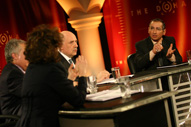 TIM SEBASTIAN
TIM SEBASTIAN
Let him say whether he agrees, rather than you answer it for him.
AUDIENCE Q (M)
You talk about the stability of Iraq, but prior to this invasion, Iraq was somewhat stable. I think that it goes even further that, you know, because of the ineptness of perhaps the leaders in the region, for not seeing to the needs of the people, that left a gaping hole for the US and its so-called allies to come in and exploit all the territories, and let us not forget that, and I am a US citizen, let us not forget that George Bush said any years ago, 'the axis of evil', that included two out of the three countries he mentioned right here in this region.
TIM SEBASTIAN
Okay. I want to let Michael Axworthy come in for a moment, then, we're going to move on.
MICHAEL AXWORTHY
I mean, we've been talking about Iraq. It strikes me, and I know a number of other people think the same way, that the position of the UK and the US forces in Iraq, delicate though it is, would have been quite impossible if the Iraqi Shias had seriously disputed their presence. Now, if Iran is fishing in these troubled waters so energetically and has got such influence with the Iraqi Shias, and it's so hell-bent on making trouble for the United States and the UK, why has that not happened two years ago? How come they're still there? I believe that if Iran had really had that influence and had really wanted to get the US and the UK out of Iraq, it could have done so within a year of the invasion.
NAZENIN ANSARI
Very good question, very good question.
TIM SEBASTIAN
And a very brief answer please.
NAZENIN ANSARI
Yes. It shows the resolve of the Iraqi people for democracy, that despite all these bombings, they go and vote in that election, because they have hope.
MICHAEL AXWORTHY
And that's a good answer, but then Iran's influence with the Iraqi Shias is not what it's been claimed to be.
TIM SEBASTIAN
All right, we're going to one more final question, we have time. Gentleman in the third row there, you've had your hand up for a long time. You, sir.
AUDIENCE Q (M)
My question is to Miss Nazenin. You said in your initial statement that Iran has been in four crises in the region. However, if we look at the US's role in those crises, we find that it's constantly supporting Israel against the Palestinians and the Palestinian-elected government, Hamas. It's invaded Iraq in the last three years, and is supporting Saad Hariri and the 14th March Movement in Lebanon, so don't you believe that the US plays an equal if not a greater role to Iran in the regional issues?
TIM SEBASTIAN
Quick answer on this please.
NAZENIN ANSARI
Well, the Middle East, everyone, every country except the Islamic regime in Iran, is for a 2-state solution, so I mean, you can't say that about the Palestine. Number 2, about Lebanon, everyone is for democracy in Lebanon except unfortunately Iran is not helping in that direction.
TIM SEBASTIAN
Dr. Mustafa, you want to come in on this.
MUSTAFA ALANI
I just want to put things right here. I'm not saying the United States is not threatened. The United States occupied, that's why we're fighting the United States in Iraq. This is why the resistance in Iraq is legitimate and legal. Yes, I'm not saying that United States does not constitute a threat to us, no, I'm not saying that, but, this doesn't mean that Iran with the behaviour now, with the nuclear issue, with the intervention in Iraq, with the occupation, with all this statement, it is really, we feel really threatened by Iran. Yes, certainly the United States is threat. Really we have to understand now we're focusing on Iran.
TIM SEBASTIAN
All right.
MUSTAFA ALANI
The discussion of the United States, you will find me at the same attitude.
Vote result
TIM SEBASTIAN
Okay, we could take questions for much longer. Unfortunately we're running out of time. We've come to that point in the proceedings where we're going to vote on the motion that 'Iran poses the greatest threat to security in the region.' Would you take the voting devices please. If you want to vote for the motion, will you press the yellow button, button 1. If you want to vote against, will you press button 2, the red button. Would you do that now please, and you only have to press it once, and by the miracles of modern technology, your vote will be sent straight to the computer and we should have the result very shortly.
Here we have the result coming up on the screen. 36.3% for the motion, 63.7% against. The motion has been decisively rejected. It just remains for me to thank our distinguished panellists, some of them have come a very long way tonight. Thanks to you, the audience. Please do come back to us next month. The Doha Debates will be here with another edition, but for the moment have a safe journey home, good night. Thank you very much, thank you.
Watch online

